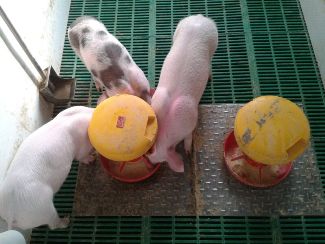Importance of Familiarity on Social Learning of Feeding Behaviour in Pigs

Neophobic avoidance of new feedsmay seem a maladaptive process for omnivorous species in intensive production systems where new diets have to be incorporated during a short period of time. However, the feeding behaviour of a mammal could change by associative learning creating new preferences or stimulating the acceptance in front of a new diet. Feed preference and acceptance are strongly influenced by individual trial and error learning but also are determined by social interactions. It has been observed in some species like rats that feed cues can be acquired by one individual (the observer) from an experienced animal (demonstrator) due to social learning. We investigated if social learning in nursery pigs could help to establish preferences towards a particular flavour after interacting with a conspecific which has eaten those compounds.
A total of 448 pigs were use in 3 consecutive experiments during the nursery period (49d-old) to study their feeding behaviour after social interactions (Figure 1). Animals were randomly selected to act as observers or as demonstrators. Demonstrator animals were temporary moved to an empty pen where 1000g of a flavoured starter feed was offered for 30 minutes. Immediately after that, demonstrator piglets were mixed with observer animals for 30 minutes. After the interaction between demonstrators and observers, demonstrator animals were returned to the empty pen.A choice test (30 minute) between the flavoured feed previously eaten by demonstrators and other flavoured feed was performed to observers after the brief interaction between both groups.Feed intake during the choice test was measured by weighing the feeders at the beginning and end of the test.
Figure 1. Experiments 1, 2 and 3. Layout of the social behaviour learning procedures between observers and demonstrators (D) post-weaning pigs under familiar [Experiment 1,2 (2 pigs) and 3] and unfamiliar (Experiment 1) interaction conditions. Control animals of experiment 3 were selected to act as observers without a previous social interaction and were not showed in this figure. Novel feed of experiment 3 had no added flavours. Close circles represent the flavoured feed eaten by demonstrator and open circles a novel flavoured feed (experiment 1 and 2) or an unflavoured known diet (experiment 3).
Observer’s pigs showed a greater intake of the feed previously eaten by demonstrators when demonstrators and observers were from the same pen or from the same litter but not when observers and demonstrators were unfamiliar with each other. Observers also preferred flavoured feeds previously eaten by the demonstrator over their already known unflavoured diet. These results show that social interactions with conspecific pigs which had a recent experience with a flavoured feed enhanced the preference for that feed and could even override neophobia. The transferred cues are presumably present around the snout of the demonstrator as a result of feeding, chewing and of the retro-nasal aroma release allowing observers to encounter the flavour and subsequently change their feeding behavior (Figure 2). This could have a great importance in some critical stages of pig development, reducing the possible energy costs associated with individual trial and error learning. However, the familiarity of conspecific demonstrators plays a key role in social learning of new feed cues probably due to selective exploration involving closer snout-to-snout contacts with kin conspecifics.
Figure 2. Diagram of flavour transmission between demonstrator and an observer pig.
References
Figueroa, Jaime; Solà-Oriol, David; Manteca, Xavier; Pérez, José Francisco. Social learning of feeding behaviour in pigs: effects of neophobia and familiarity with the demonstrator conspecific. Applied Animal Behaviour Science 148(1-2): 120-127. 2013.


